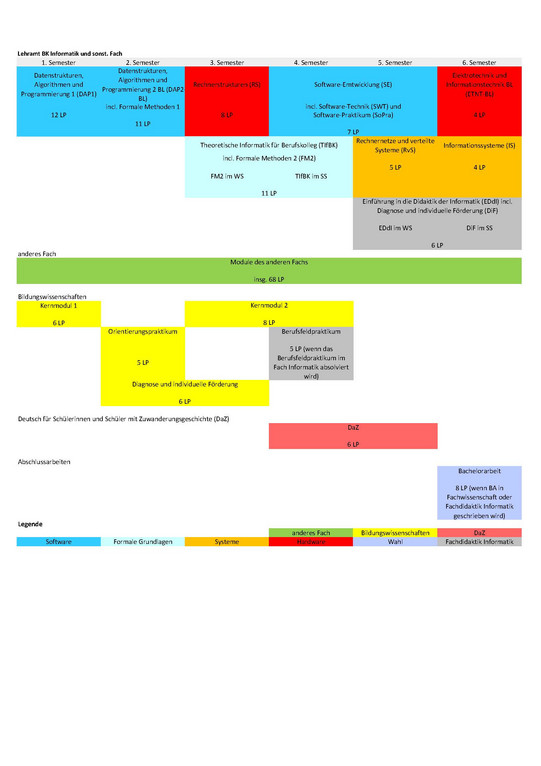Bachelor's degree program in computer science at vocational college
You can study Computer Science at the Technische Universität Dortmund as a teaching subject for the teaching profession at grammar schools and comprehensive schools and for the teaching profession at vocational colleges. As a student teacher, you will take part in the same courses in Computer Science (with the exception of subject didactics) as students of the Bachelor's programs in Computer Science and Applied Computer Science and thus receive a high-quality professional education.
This bachelor's degree program is followed consecutively by the master's degree program for teachers. Completion of the master's program is equivalent to the first state examination and enables you to be employed in the preparatory service (Referendariat). The choice of computer science as a subject prepares you for teaching at both a technical and a business vocational college.
The bachelor's degree program for teachers is a full-time and attendance-based program with a standard period of study of six semesters (three years) and, depending on the subject chosen, is completed with the degree Bachelor of Arts (B.A.) or Bachelor of Science (B.Sc.).
Below is an example study plan with its different modules. Here you can find further study plans.
A detailed description of the individual modules as well as your examination regulations can be found here.

Structure of the subject Computer Science for the teaching profession at vocational colleges (Bachelor)
In Computer Science, the courses prepare you for the broad range of topics you will teach as a teacher at a vocational college.
Software cycle (dark blue) In the courses of the software cycle you learn to develop software. The spectrum ranges from creating small programs to investigating the efficiency of certain algorithms to developing larger projects in a team.
Formal methods, (light blue) which you will later use and teach yourself in order to analyze problems and solve them as efficiently as possible, you will learn in the courses formal methods and theoretical computer science for vocational college.
ComputerEngineering (red) You will gain insight into how computers work in the lecture Computer Structures. The course Electrical and Communications Engineering prepares you for teaching at technical vocational colleges if you have not chosen Electrical Engineering as another subject anyway. (Modules that prepare you for teaching at a vocational college for business can be chosen in the consecutive master's program).
You will learn aboutcentral systems (orange) of computer science in lectures from the areas of computer networks and distributed systems, information systems (databases) and, depending on your subject combination, operating systems. (If necessary, you should choose operating systems in the consecutive Master's program).
In order for you to be able to pass the practical semester of the consecutive Master's program at various vocational colleges, the curriculum already requires you to have a broad technical basis in the Bachelor's program. The elective options are therefore only available to you in the Master's program.
Finally, the courses on subject didactics (gray) prepare you for your role as a computer science teacher at a vocational college.
Computer science as a school subject
Computer science is a general education subject in all types of schools. At vocational colleges, computer science is also part of the professional knowledge taught. The unique features of computer science include the formal handling of data and information - comparable to the formula system of physics for forces and energy - as well as the analysis of problems, solutions and their efficiency.
An important question in computer science is which problems can be solved automatically and, if so, how efficiently. At the same time, computer science also offers students the opportunity to test their ideas practically by designing, programming, and evaluating computer programs.
"Computational thinking is a fundamental skill for everyone, not just for computer scientists. To reading, writing, and arithmetic, we should add computational thinking to every child's analytical ability." (Jeanette M. Wing)
Practice in the Bachelor's program
You will apply the knowledge imparted in lectures not only in practice groups, but also in the internships integrated into the curriculum. In the software internship, you will work on challenging software projects in groups to gain valuable programming experience and skills such as teamwork and project management.

![[Translate to English:] [Translate to English:]](/storages/zentraler_bilderpool/_processed_/d/f/csm_Informatik_777f60dc25.jpg)

![[Translate to English:] [Translate to English:]](/storages/zentraler_bilderpool/_processed_/1/b/csm_Figuren-nachdenklich_0daa1f91f8.jpg)
![[Translate to English:] [Translate to English:]](/storages/cs/_processed_/6/f/csm_teamwork1_e113f5f13b.png)
![[Translate to English:] [Translate to English:]](/storages/cs/_processed_/e/1/csm_header_ee496f74bf.png)